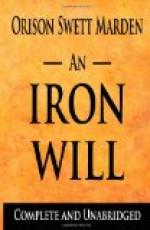The man of iron will is cool in the hour of danger.
“I HAD TO RUN LIKE A CYCLONE.”
This was what Roosevelt said about his pushing on up San Juan Hill ahead of his regiment: “I had to run like a cyclone to stay in front and keep from being run over.”
The personal heroism of Hobson, or of Cushing, who blew up the “Albemarle” forty years ago, was but the expression of a magnificent will power. It was this which was the basis of General Wheeler’s unparalleled military advancement: a second lieutenant at twenty-three, a colonel at twenty-four, a brigadier-general at twenty-five, a major-general at twenty-six, a corps commander at twenty-seven, and a lieutenant-general at twenty-eight.
General Wheeler had sixteen horses killed under him, and a great number wounded. His saddle equipments and clothes were frequently struck by the missiles of the enemy. He was three times wounded, once painfully. He had thirty-two staff officers, or acting staff officers, killed or wounded. In almost every case they were immediately by his side. No officer was ever more exposed to the missiles of death than Joseph Wheeler.
What is this imperial characteristic of manhood, an iron will, but that which underlies all magnificent achievement, whether by heroes of the “Light Brigade” or the heroic fire-fighters of our great cities?
CHAPTER IV.
WILL POWER IN ITS RELATION TO HEALTH AND DISEASE.
I.
There is no doubt that, as a rule, great decision of character is usually accompanied by great constitutional firmness. Men who have been noted for great firmness of character have usually been strong and robust. As a rule it is the strong physical man who carries weight and conviction. Take, as an example, William the Conqueror, as he is pictured by Green in his history:
“The very spirit of the sea-robbers from whom he sprang seemed embodied in his gigantic form, his enormous strength, his savage countenance, his desperate bravery. No other knight under heaven, his enemies confessed, was William’s peer. No other man could bend William’s bow. His mace crashed through a ring of English warriors to the foot of the standard. He rose to his greatest heights in moments when other men despaired. No other man who ever sat upon the throne of England was this man’s match.”
Or, take Webster. Sydney Smith said: “Webster is a living lie; because no man on earth can be as great as he looks.” Carlyle said of him: “One would incline at sight to back him against the world.” His very physique was eloquent. Men yielded their wills to his at sight.
The great prizes of life ever fall to the robust, the stalwart, the strong,—not to a huge muscle or powerful frame necessarily, but to a strong vitality, a great nervous energy. It is the Lord Broughams, working almost continuously one hundred and forty-four hours; it is the Napoleons, twenty hours in the saddle; it is the Franklins, camping out in the open air at seventy; it is the Gladstones, firmly grasping the helm of the ship of state at eighty-four, tramping miles every day, and chopping down huge trees at eighty-five,—who accomplish the great things of life.




